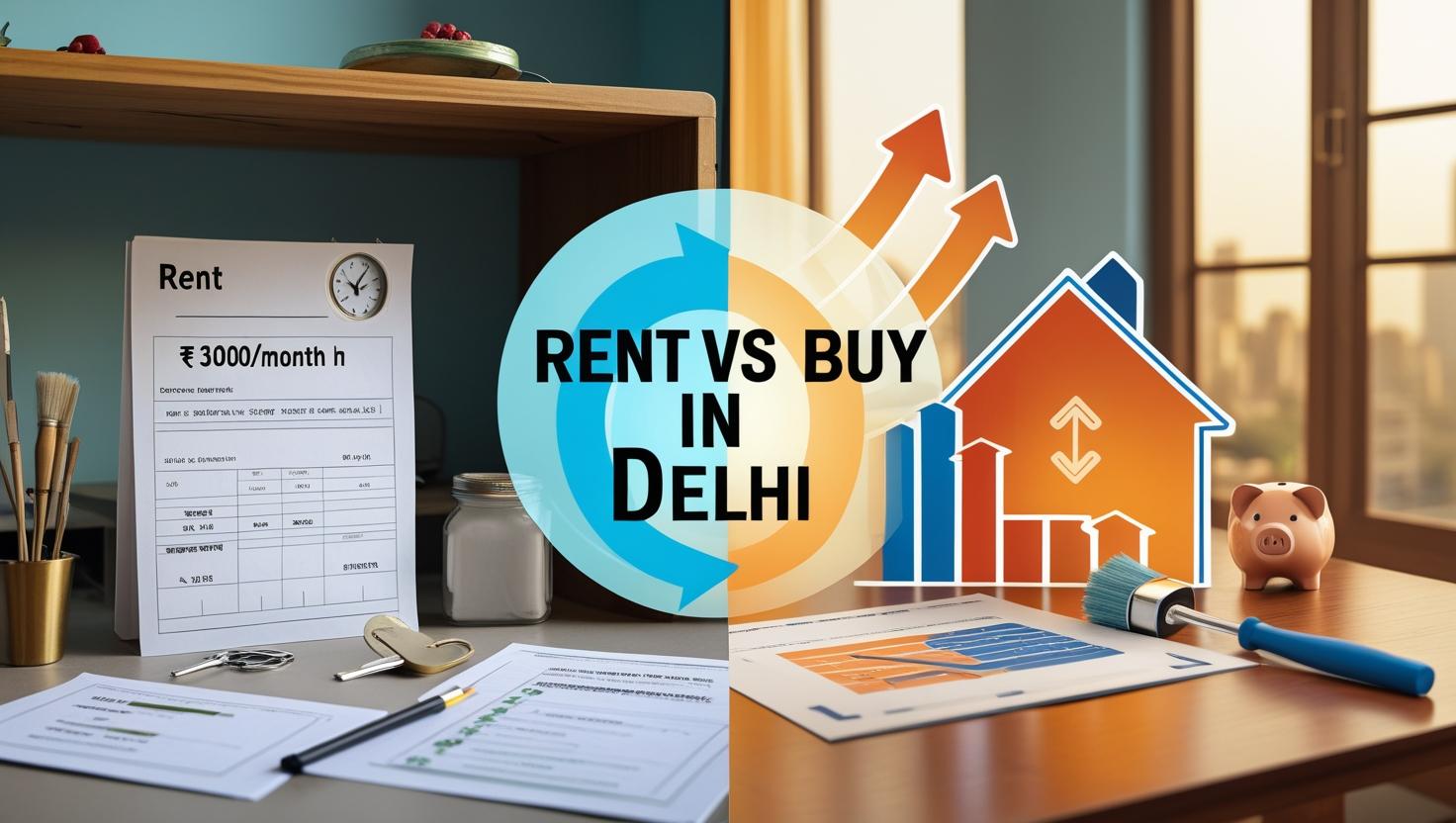Deciding between renting vs buying in Delhi is a significant financial and lifestyle choice that many residents face. Both options come with their own set of advantages and challenges, influenced by factors such as market trends, personal finances, and long-term goals. In this comprehensive guide, we’ll explore the current real estate landscape in Delhi as of 2025, and delve into the pros and cons of renting versus buying to help you make an informed decision.
Delhi’s Real Estate Market in 2025
As of 2025, Delhi’s real estate market has experienced notable shifts. According to a Reuters poll, average home prices in India are expected to rise by 6.5% this year, driven predominantly by demand from affluent buyers.
Source : Reuters
This trend is particularly evident in major cities like Delhi, where property values have surged due to limited supply and high demand.
Simultaneously, rental costs are projected to increase at an even faster rate, with urban areas anticipating a 7.0%-10.0% hike over the coming year.
Source : Reuters
This escalation in both property prices and rents presents a complex scenario for individuals contemplating between renting and buying.
Advantages of Renting in Delhi
- Flexibility: Renting offers the freedom to relocate without the long-term commitment associated with property ownership. This is particularly beneficial for individuals whose careers or personal circumstances may require mobility.
- Lower Upfront Costs: Renting typically involves a security deposit and advance rent, which are considerably lower than the down payment, stamp duty, and registration charges required when purchasing a property.
- No Maintenance Responsibilities: Landlords are generally responsible for property maintenance and repairs, relieving tenants of these additional expenses and efforts.
- Financial Liquidity: Renting allows individuals to maintain liquidity, enabling them to invest in other avenues such as mutual funds, stocks, or business ventures, potentially yielding higher returns.
Disadvantages of Renting in Delhi
- Lack of Asset Building: Rent payments do not contribute to asset creation. Over time, this could be viewed as a financial drawback, especially considering the escalating rental rates in urban areas.
- Rent Escalation: Landlords may increase rent periodically, leading to higher living expenses without any corresponding increase in benefits or services.
- Limited Control: Tenants often face restrictions on property modifications and must adhere to the landlord’s terms, limiting personalization and control over the living space.
Advantages of Buying in Delhi
- Asset Appreciation: Property ownership allows individuals to benefit from capital appreciation. With property prices in Delhi expected to rise, homeowners could see significant returns on their investment over time.
- Stability and Security: Owning a home provides a sense of permanence and security, eliminating concerns about lease renewals or potential eviction.
- Tax Benefits: Homeowners can avail tax deductions on home loan interest and principal repayments under the old tax regime, reducing the overall tax liability.
Source : The Times of India - Creative Freedom: Homeownership allows individuals to renovate and customize their property to suit personal preferences without seeking approval from a landlord.
Disadvantages of Buying in Delhi
- High Upfront Costs: Purchasing a property involves substantial initial expenses, including down payment, stamp duty, registration fees, and other ancillary charges.
- Maintenance Responsibilities: Homeowners are responsible for all maintenance and repair costs, which can be both time-consuming and financially demanding.
- Reduced Flexibility: Owning a property can limit mobility, making it challenging to relocate for career opportunities or personal reasons without the complexities of selling or renting out the property.
- Market Risks: Property values are subject to market fluctuations. Economic downturns or changes in the real estate market can impact the property’s value and the owner’s investment.
Financial Considerations
When evaluating the financial implications of renting versus buying, it’s essential to consider both immediate and long-term factors:
- Upfront Costs: Renting requires a security deposit and possibly a few months’ rent in advance. In contrast, buying necessitates a down payment (typically 10%-20% of the property’s value), along with stamp duty, registration fees, and other charges.
- Recurring Expenses: Renters have predictable monthly rent payments, while homeowners must account for home loan EMIs, property taxes, maintenance costs, and insurance premiums.
- Opportunity Cost: Funds allocated for a down payment could be invested elsewhere, potentially yielding higher returns. Prospective buyers should assess whether property appreciation aligns with their investment goals.
Case Study: Rishabh Pant’s Dilemma
Consider the scenario of Rishabh Pant, a resident of Indirapuram, Ghaziabad, Delhi-NCR. For the past three years, he has been renting a 3BHK-plus-study apartment, paying approximately ₹30,000 per month, including maintenance. Facing a rent increase to ₹35,000, Pant opted to move to Greater Noida West, reducing his rental expenses but increasing his commute by 10 kilometers. Despite a budget of ₹1 crore, Pant finds it challenging to purchase a home due to insufficient funds for a down payment and limited options within his price range.
Source : Hindustan Times
Current Market Trends
Recent data indicates that in several micromarkets across major cities, property prices have appreciated faster than rental incomes between 2021-end and 2024-end. For instance, in Delhi-NCR’s Sohna Road, capital values increased by 59%, while rental values rose by 47%. Similarly, Noida’s Sector-150 witnessed a staggering 128% rise in capital values, with rental values increasing by 66% during the same period.
Source : Upstox – Online Stock and Share Trading
Making the Decision: Renting Vs Buying in Delhi
The choice between renting and buying hinges on individual circumstances, financial readiness, and personal preferences. To assist in making an informed decision, consider the following factors:
1. Financial Readiness
- Savings and Down Payment: Purchasing a home requires a substantial down payment, typically around 20% of the property’s value. If accumulating this amount strains your finances, renting might be a more viable option until sufficient savings are secured.
Source : The Economic Times - Income Stability: Stable and predictable income is crucial for managing monthly mortgage payments. If your income is uncertain or varies significantly, renting can provide more flexibility without the long-term financial commitment of a mortgage.
Source : aurumproptech.in
2. Duration of Stay
- Short-Term Plans: If you anticipate relocating within a few years due to career or personal reasons, renting offers the flexibility to move without the complexities of selling a property.
- Long-Term Residency: Planning to stay in one location for an extended period may justify the investment in purchasing a home, allowing you to build equity over time.
3. Market Conditions
- Property Appreciation: In markets where property values are steadily increasing, buying can be a sound investment. However, in areas with stagnant or declining prices, renting might be more prudent.
- Rental Market: Escalating rents, as observed in urban areas like Delhi, can make buying a more cost-effective option in the long run.
4. Lifestyle Considerations
- Flexibility: Renting provides the freedom to relocate without the burden of property transactions, suiting those who prioritize mobility.
- Customization: Homeownership allows for personalization and modifications to your living space, aligning with long-term lifestyle preferences.
5. Tax Implications
- Homeownership Benefits: Under the old tax regime, homeowners in India can avail tax deductions on home loan interest and principal repayments, reducing overall tax liability.
- Renting Benefits: Renters can claim tax benefits under House Rent Allowance (HRA) provisions, provided their salary structure includes it.
Conclusion
Deciding between renting and buying a home in Delhi requires a thorough assessment of your financial situation, lifestyle preferences, and long-term goals. Given the current market trends, with rising property prices and rental costs, it’s essential to weigh the pros and cons carefully. Utilizing tools like rent vs. buy calculators can provide personalized insights based on your specific circumstances. Ultimately, the decision should align with your financial readiness, stability, and personal aspirations.
Source : Reuters
Source : India home prices to climb faster than inflation this year, rents even more: Reuters poll
Source : Reuters
Source : India home prices to rise 6.5% in 2025, driven by demand from wealthy – Reuters poll


